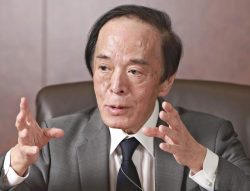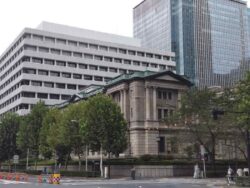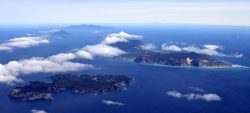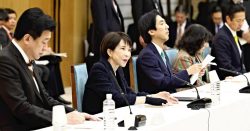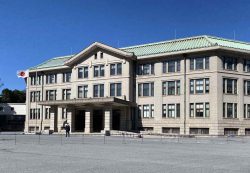Lodging Taxes Mulled Across Japan as Response to Overtourism; Business Community Voices Concerns About Impact
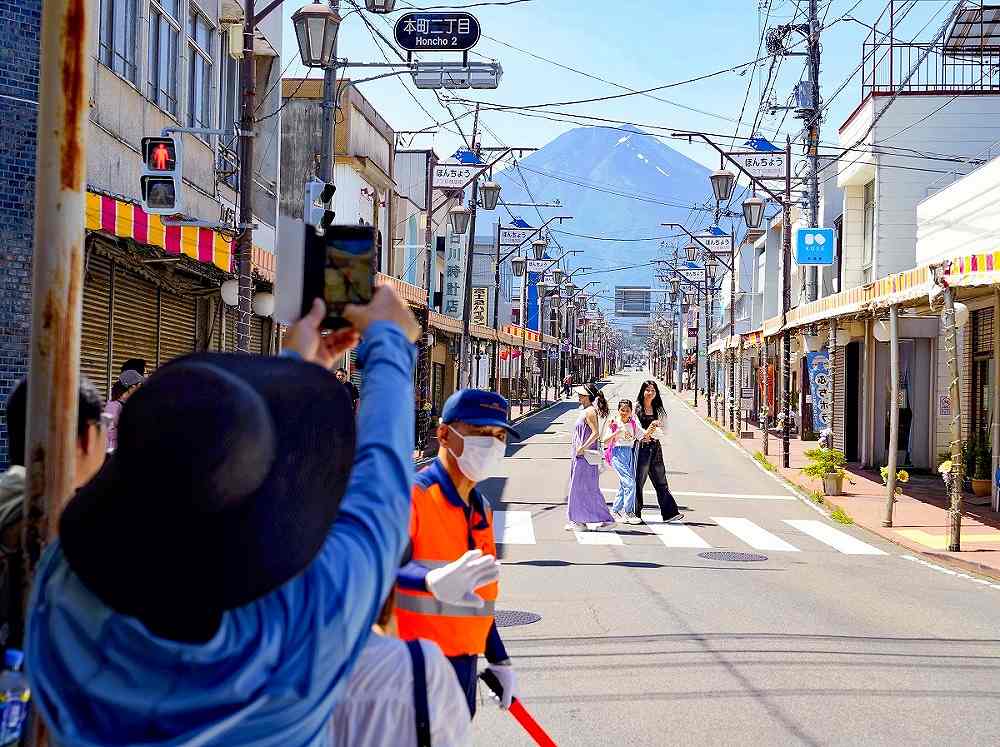
Foreign tourists take pictures in Fujiyoshida, Yamanashi Prefecture, on July 7.
1:00 JST, July 23, 2024
Local governments are considering charging tourists a lodging tax to help deal with overtourism, as the number of foreign visitors to Japan surges. Twelve municipalities have already introduced such taxes, while more than 40 are considering introducing them to raise money for better tourism infrastructure.
But as municipalities design the new taxes, some accommodation businesses are voicing their opposition.
Littering, parking violations
The area around a crosswalk in Fujiyoshida, Yamanashi Prefecture, bustles with foreign tourists holding cameras and smartphones.
The once-deserted shopping district around the crossing has become a hot topic on social media, since visitors there can snap pictures of a classic Japanese shopping street with Mt. Fuji in the background. On some days, more than 4,000 tourists visit the area.
Some tourists take pictures standing in the middle of the road or crossing the street when the cross signal is red.
“It’s nice to see the area bustling with people, but many people don’t follow the traffic rules,” a 68-year-old owner of a household goods store in the district said. “I hope something can be done about it.”
In March, Fujiyoshida announced it wanted to introduce a lodging tax.
Visitors to the city’s scenic Arakurayama Sengen Park, which offers a panoramic view of Mt. Fuji and a five-story pagoda, are expected to total nearly 1.7 million this fiscal year, up from about 300,000 in fiscal 2016. The surge in tourists has led to littering and unauthorized parking.
The lodging tax that the city aims to introduce in fiscal 2026 is expected to fund responses to overtourism.
Half of expenses covered
A lodging tax is a local tax levied on hotel guests. It is classified as a special purpose tax, and for local governments to introduce one they must pass a draft ordinance that includes the purpose of the tax, when the tax will be applied and the tax rate, and gain approval from the internal affairs and communications minister.
The first such tax was applied by the Tokyo metropolitan government in 2002, and 12 municipalities have introduced similar taxes — including three municipalities that will begin levying them soon — while more than 40 municipalities are considering introducing one.
Momentum toward such taxes waned as the pandemic took hold and the tourism industry contracted. However, the Japan National Tourism Organization announced Friday that visitors to Japan in the first half of 2024 reached a record 17.77 million, and the rapid recovery in visitors has led to a new push for lodging taxes.
The taxes have proven to be an important source of revenue for municipalities that have introduced them. Kyoto, which forecasts ¥4.8 billion from its lodging tax in its fiscal 2024 budget, began operating its Sightseeing Limited Express Bus in June that stops only at major tourist spots. The measure is aimed at ensuring more space for residents on city buses, which have been overcrowded.
Fukuoka introduced its own lodging tax in April 2020. A city official said the revenue has helped the city “implement new projects, stimulating tourism in the city.”
With about ¥2.8 billion in revenue from the tax, or nearly half of the ¥5.8 billion in tourism-related expenses in its 2024 budget, the city plans to attract international conferences and other events.
Opposition from businesses
However, accommodation businesses, who are responsible for collecting the tax, have voiced concern.
Last month, the snowy resort town of Yuzawa in Niigata Prefecture announced it wanted to introduce a lodging tax to fund a transport network linking major stations and lodging areas. Hotel operators convened by the city voiced concerns about the administrative burden and decreased competitiveness due to the de facto increase in lodging rates.
Eighteen groups of lodging businesses in Miyagi Prefecture convened on July 8 to state their opposition to the tax in writing to the Miyagi prefectural government, which is considering a draft ordinance that would impose a flat ¥300 lodging fee throughout the prefecture.
The groups are concerned about the tax burden visitors could face since some municipalities have already imposed a bathing tax, and because the industry has not recovered from the pandemic.
Kinichi Fujita, a vice president of the ryokan association council in Naruko Onsen-kyo Hot Spring Village in Osaki, Miyagi Prefecture, is concerned that the tax would drive hotel guests to neighboring prefectures.
“The business community has not given its support nor been persuaded about the introduction [of a lodging tax],” he said.
Top Articles in Business
-

Prudential Life Insurance Plans to Fully Compensate for Damages Caused by Fraudulent Actions Without Waiting for Third-Party Committee Review
-

Japan, U.S. Name 3 Inaugural Investment Projects; Reached Agreement After Considerable Difficulty
-

Toyota Motor Group Firm to Sell Clean Energy Greenhouses for Strawberries
-

Japan’s Major Real Estate Firms Expanding Overseas Businesses to Secure Future Growth, Focusing on Europe, U.S., Asia
-

SoftBank Launches AI Service for Call Centers That Converts Harsh Customer Voices into Softer Voices
JN ACCESS RANKING
-

Producer Behind Pop Group XG Arrested for Cocaine Possession
-

Japan PM Takaichi’s Cabinet Resigns en Masse
-

Man Infected with Measles Reportedly Dined at Restaurant in Tokyo Station
-

Israeli Ambassador to Japan Speaks about Japan’s Role in the Reconstruction of Gaza
-

Videos Plagiarized, Reposted with False Subtitles Claiming ‘Ryukyu Belongs to China’; Anti-China False Information Also Posted in Japan



